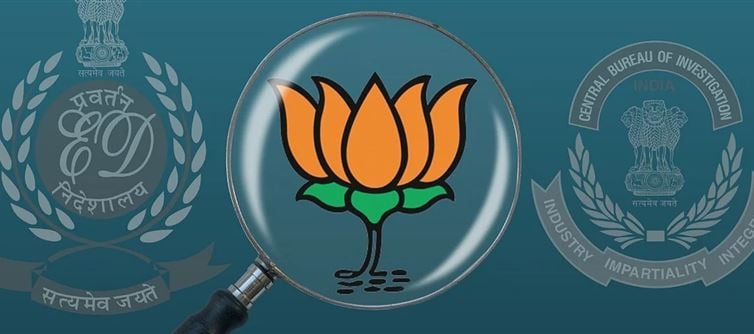
India’s constitution guarantees independent investigative institutions — from the judiciary and election commission to cbi and the Income Tax Department. These bodies are meant to operate free of political bias, upholding fairness and the rule of law. But in practice, a pattern of politically motivated misuse has emerged under the BJP-led central government.
Across states like Tamil Nadu, Maharashtra, jharkhand, West Bengal, and Kerala, raids by enforcement agencies disproportionately target opposition politicians, business leaders, and even film personalities, while allies often escape scrutiny. The supreme court has repeatedly highlighted that enforcement bodies cannot be instruments of political vendetta, yet the trend continues unabated.
The central question now: when investigative power is wielded as a political weapon, who is truly serving the nation — and who is serving party interests?
1. Political Targeting Under the Modi Government
Opposition leaders, business figures, and media personalities are routinely investigated by cbi and Income Tax authorities. In tamil Nadu, the bjp has used enforcement agencies to pressure the ruling DMK, creating bottlenecks and disrupting governance. Similarly, cases in jharkhand and delhi highlight how anti-BJP figures like Hemant Soren and Arvind Kejriwal faced legal harassment.
2. Selective Action and Impunity for Allies
Cases against opposition-aligned individuals often escalate aggressively, while those who switch allegiance to the BJP or act favorably see charges dropped or stalled indefinitely. This pattern exposes enforcement agencies not as impartial institutions, but as instruments of political reward and punishment.
3. Tamil Nadu’s TASMAC Raids — A supreme court Rebuke
The Income Tax Department’s raids on Tamil Nadu’s state-run TASMAC liquor organization — including offices of ministers and even the Chief Minister’s office — sparked Supreme court criticism. The court questioned how an investigative agency could enter government offices without authorization, calling the actions violations of federal principles and administrative protocol.
4. Long-Term Political Strategy
The bjp appears to be leveraging enforcement overreach to create maximum disruption before elections. Targeting state ministers, their families, and business associates serves a dual purpose:
Weakening political opposition,
Signaling to bureaucrats and allies the cost of non-compliance.
5. Supreme court Pushback and Legal Battles
While the enforcement agencies continue aggressive actions, the supreme court has intervened to curb overreach, reaffirming the federal structure and rule of law. The TASMAC case serves as a landmark precedent: no government office, state or otherwise, can be arbitrarily raided without checks.
6. The Broader Democratic Crisis
Beyond individual cases, the repeated misuse of cbi, Income Tax, and election commission authority erodes public trust in institutions. Political parties allege — with evidence — that enforcement agencies now operate under the control of the central bjp government, jeopardizing the integrity of India’s democratic system.
⚡ CONCLUSION
Investigative agencies like cbi and Income Tax were created to protect justice and transparency, not enforce political vendettas. Yet under the current central government, these institutions are increasingly perceived as tools for intimidation, pressure, and electoral advantage.
The supreme Court’s interventions are reminders that democracy demands checks, balances, and impartiality. But until political misuse stops, India’s institutions risk losing credibility, autonomy, and the public’s faith.




 click and follow Indiaherald WhatsApp channel
click and follow Indiaherald WhatsApp channel